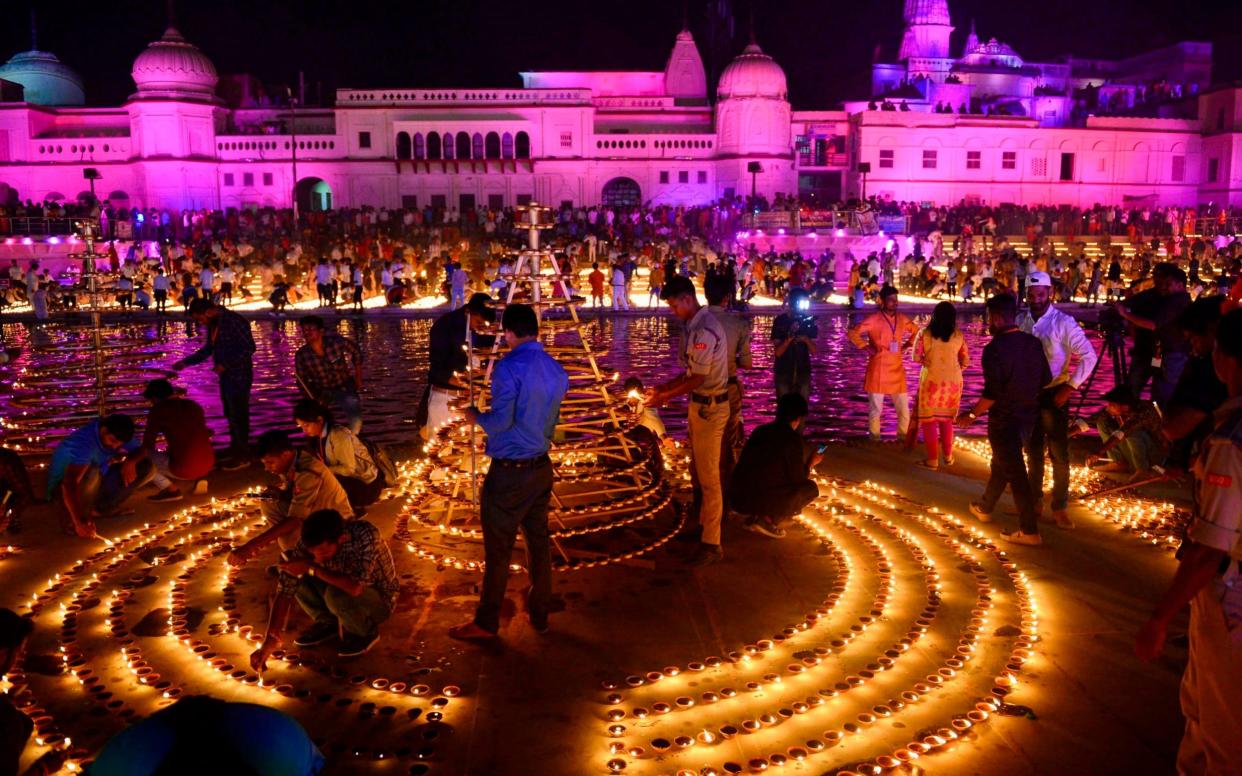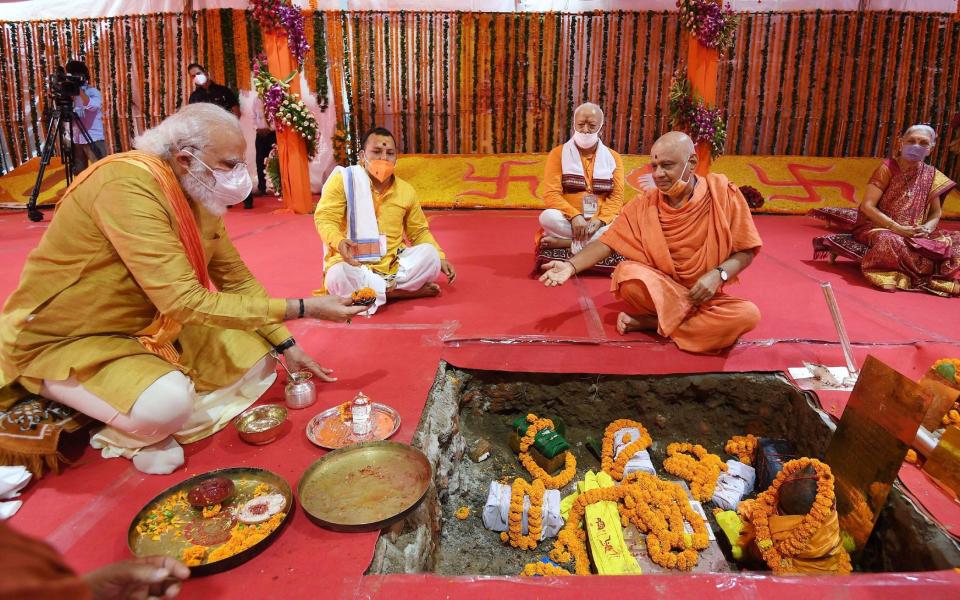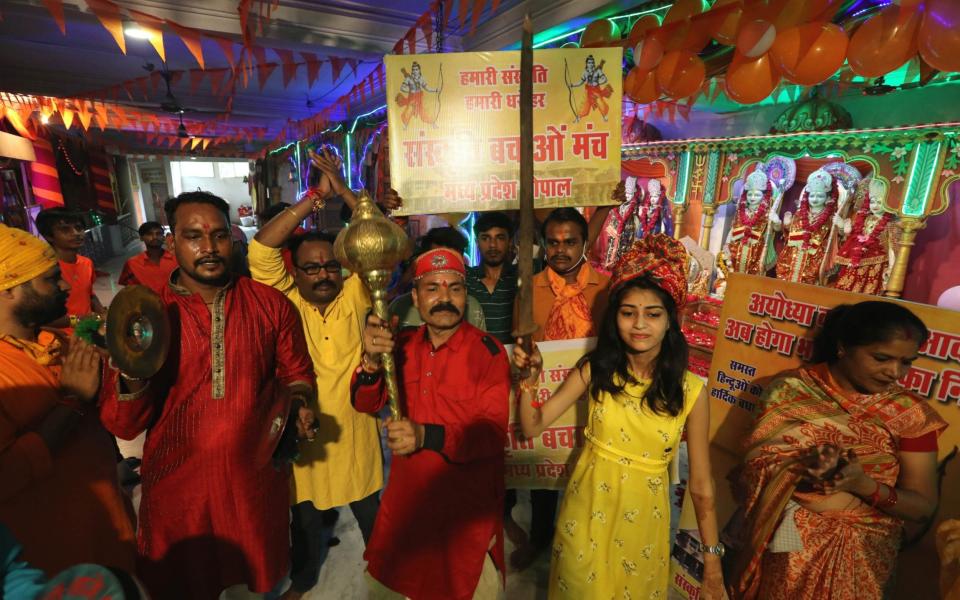Narendra Modi lays Ayodhya temple foundation, delighting Hindus and dismaying Muslims

Narendra Modi, the Indian Prime Minister, has invigorated his Hindu support base after laying the foundation stone of a controversial new temple on a site contested by Muslims.
In November, after a decades-old legal battle, India’s highest court ruled a temple could be built in the city of Ayodhya, where a mosque had stood until it was destroyed by Hindu mobs in 1992.
Mr Modi made its construction a key pledge as part of his Hindu nationalist campaign, which saw him re-elected with a landslide victory last year.
Many Hindus believe the deity Ram was born at the temple site in Ayodhya, and soil was gathered from more than 2,000 holy sites for its building work.
Calling it the “dawn of a new era”, Mr Modi said: “India is emotional as decades of wait has ended. For years, our Ram Lalla [the infant Lord Ram] lived beneath a tent; now he will reside in a grand temple.”

Coverage of the event was broadcast across the nation, and reports say that devotees from across the country have been sending silver and gold - in the form of coins, bricks and bars - to use in the construction of the temple.
Police officers are said to have been ordered to guard these donations. As many as 200,000 bricks inscribed with "Shri Ram" (Lord Ram) that have been collected over the years will be used to build the foundation of the temple, according to the Times of India.
“Goosebumps as PM Modi-ji speaks from Ram Janambhoomi in Ayodhya. Privileged to be born in this era and exist on this historic day. Never in life felt so devout and elated,” wrote one Twitter user.
“The struggle was 500 years old and finally we won, Jai Shree Ram,” echoed another.

Activists and observers say the construction of the temple is the latest example of Mr. Modi and his ruling Bharatiya Janata Party (BJP) discriminating against India’s 200-million strong Muslim minority.
Wednesday also marks one year since Mr Modi scrapped the autonomous status for India’s only Muslim-majority state of Jammu and Kashmir, which it had held since independence from British rule in 1947.
In February, New Delhi experienced its deadliest inter-religious riots in decades after a BJP politician called on residents to clear the roads of Muslims who had been protesting against an exclusionary citizenship bill, the Citizenship Amendment Act.
Police were deployed onto the streets of Ayodhya on July 31 in anticipation of unrest, despite a spike in recent Muslim emigration from the city.
The ceremony passed peacefully and was attended by two prominent Muslim figures, although, in general, Muslims expressed frustration at the temple’s construction.

“Usurpation of the land by an unjust, oppressive, shameful and majority-appeasing judgment can’t change its status,” the All-India Muslim Personal Law Board said.
Mamata Banerjee, the Chief Minister of West Bengal, also appealed for India to embrace unity in its diversity.
Mr Modi arrived in Ayodhya in the morning and, after leading prayers, laid a 40kg silver foundation stone to start construction.
“We have to ensure that the message of Lord Shri Ram, the message of [the] Ram temple, the message of our thousands of years of tradition - how it can continue to reach the whole world,” he proclaimed, in an emotionally-charged speech.
Mr Modi also said the construction of the temple, which will take up to three years, will invigorate Ayodhya’s economy by attracting Hindu pilgrims.
Amit Shah, Mr Modi’s long-time political ally and India’s current home minister, was conspicuous in his absence after testing positive for Covid-19 on Sunday.
Rumours had circulated that Mr Modi may have been forced to miss the ceremony after holding a cabinet meeting with Mr. Shah at his residence last Wednesday.


